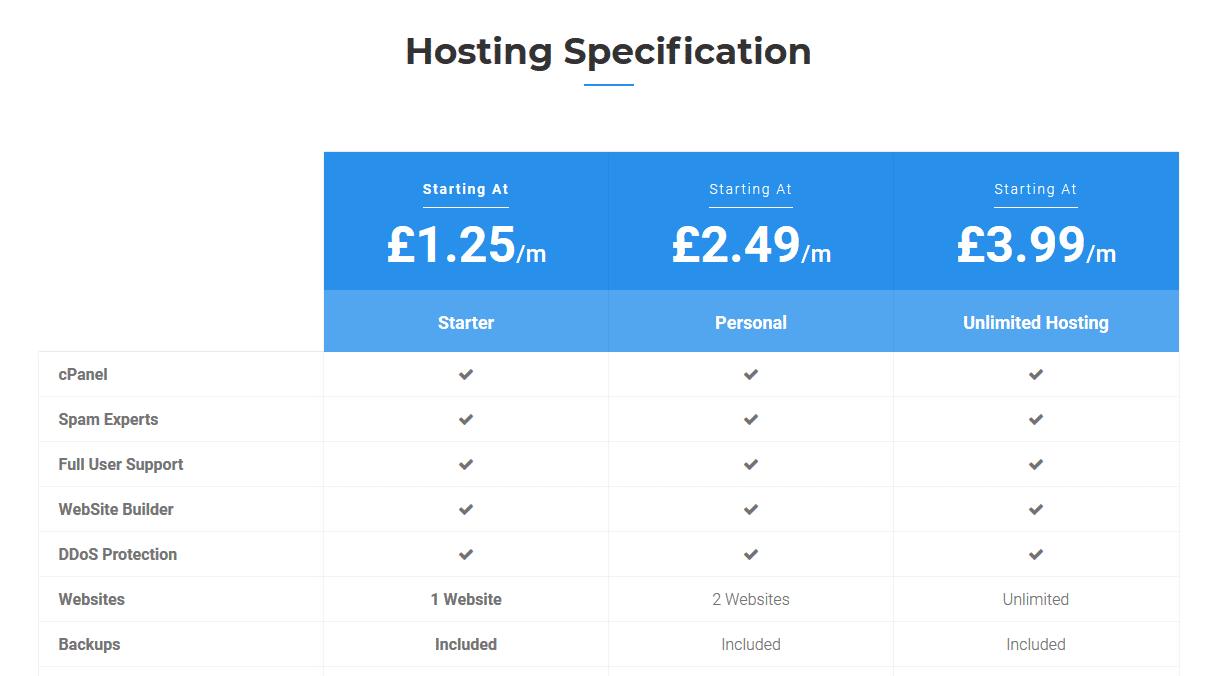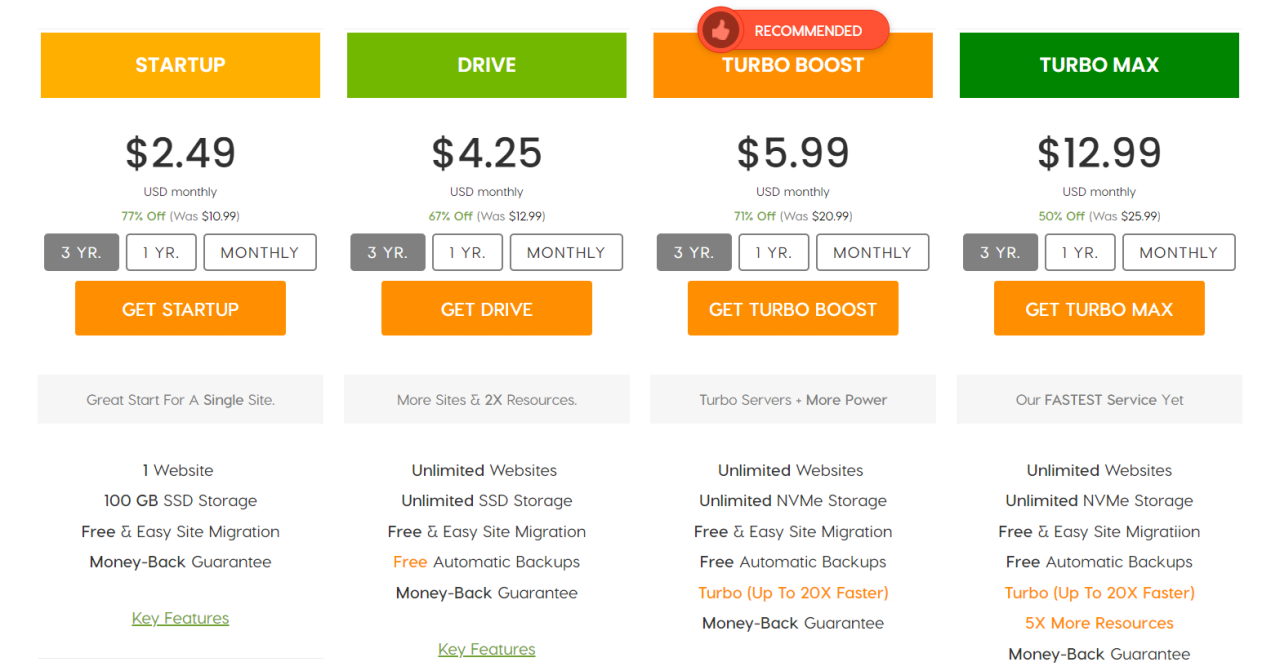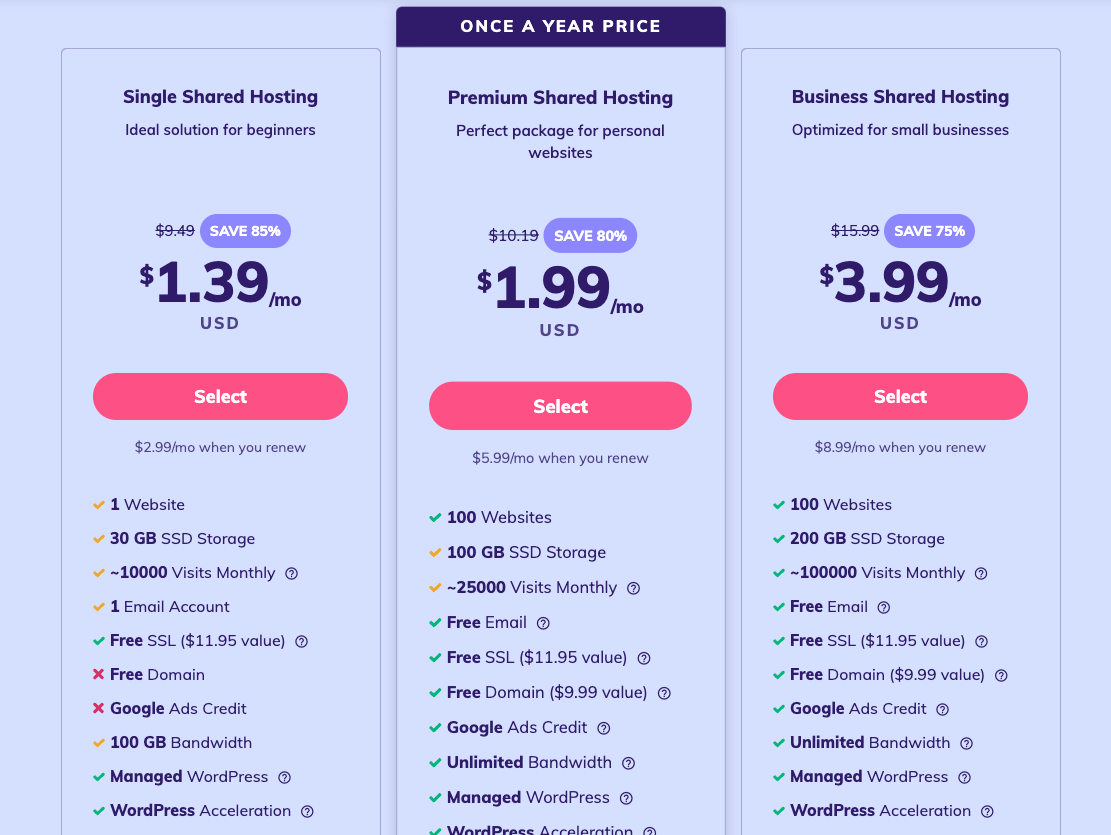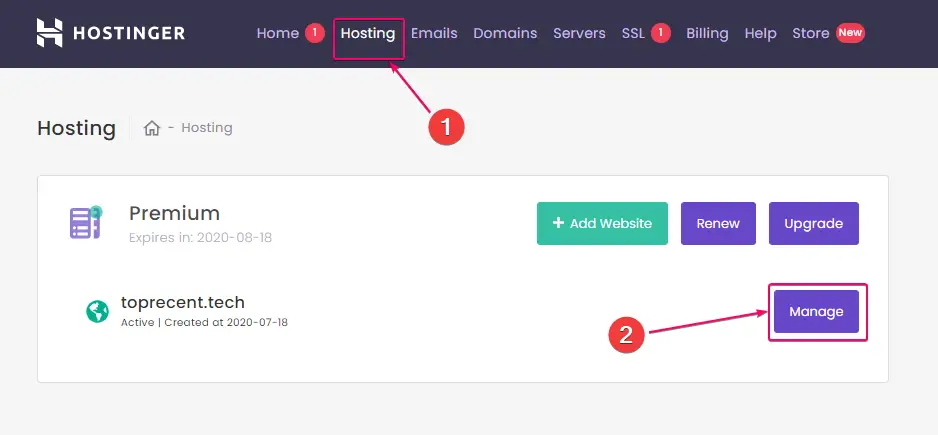Hosting packages set the stage for your website’s success, providing the foundation for your online presence. From shared hosting, where multiple websites share resources, to dedicated hosting, where you have exclusive access to a server, understanding the different types of hosting packages is crucial for making informed decisions. This comprehensive guide will delve into the key features, considerations, and best practices for choosing the optimal hosting package to meet your unique needs.
We’ll explore the essential components of a hosting package, such as storage space, bandwidth, databases, and security features. You’ll learn about the advantages and disadvantages of different hosting types, including shared, VPS, dedicated, cloud, and managed hosting. By analyzing pricing structures, common upsells, and add-ons, we’ll equip you with the knowledge to make a confident and cost-effective decision.
Understanding Hosting Packages

Hosting packages are the foundation for any website’s online presence. They offer a range of resources and services that allow your website to be accessible on the internet. Understanding the different components and types of hosting packages is crucial for choosing the right one for your needs.
Key Components of a Hosting Package
The essential components of a hosting package are:
- Disk Space: This refers to the amount of storage space allocated for your website’s files, including images, videos, and code. The required disk space depends on the size and complexity of your website.
- Bandwidth: Bandwidth represents the amount of data that can be transferred between your server and visitors’ browsers. It determines how much traffic your website can handle without performance issues.
- CPU Resources: Central Processing Unit (CPU) resources determine the processing power available for your website. A higher CPU allocation is crucial for websites with complex functionalities or high traffic.
- Database: Websites often require databases to store information such as user data, products, or blog posts. The hosting package should provide a suitable database solution.
- Security Features: Security is paramount for any website. Hosting packages typically include features like firewalls, malware scanning, and SSL certificates to protect your website from attacks.
- Email Accounts: Many hosting packages include email accounts for your domain, allowing you to create professional email addresses like “[email protected]”.
- Technical Support: Access to technical support is essential for resolving issues or seeking assistance with your website. The level of support provided varies between hosting providers.
Types of Hosting Packages
Hosting packages cater to diverse website needs and resources. Some common types include:
- Shared Hosting: Shared hosting is an affordable option where multiple websites share the same server resources. It’s suitable for small websites with low traffic.
- VPS Hosting: Virtual Private Server (VPS) hosting provides a dedicated portion of a server’s resources, offering more control and performance than shared hosting. It’s ideal for growing websites with moderate traffic.
- Dedicated Hosting: Dedicated hosting offers an entire server dedicated to your website, providing the highest level of performance, security, and control. It’s suitable for high-traffic websites or those with demanding resource requirements.
- Cloud Hosting: Cloud hosting utilizes a network of servers to distribute website resources, ensuring high availability and scalability. It’s a flexible and reliable option for businesses of all sizes.
Factors to Consider When Choosing a Hosting Package
Choosing the right hosting package involves considering several factors:
- Website Traffic: Estimate your expected website traffic to determine the required bandwidth and server resources.
- Website Size and Complexity: The size and complexity of your website influence the necessary disk space and CPU resources.
- Budget: Set a realistic budget for your hosting package, taking into account the features and resources required.
- Security Needs: Evaluate your website’s security requirements and ensure the chosen hosting package offers adequate protection.
- Technical Expertise: Assess your technical expertise and choose a hosting package with the appropriate level of support and control.
Key Features of Hosting Packages

Choosing the right hosting package involves understanding the key features that are essential for your website’s performance and success. These features directly impact your website’s functionality, security, and overall user experience.
Storage Space
Storage space refers to the amount of digital space allocated for your website’s files, including images, videos, databases, and other content. It’s crucial to choose a hosting package with sufficient storage to accommodate your website’s current and future needs. Insufficient storage can lead to slow loading times, website crashes, and even data loss.
For instance, if your website has a large number of high-resolution images or video content, you’ll need a hosting package with ample storage capacity.
Bandwidth
Bandwidth represents the amount of data that can be transferred between your server and visitors’ browsers within a specific time frame. It determines how quickly your website loads for users. Websites with high traffic require more bandwidth to handle the increased data transfer demands.
For example, an e-commerce website with a large product catalog and numerous visitors will require significant bandwidth to ensure smooth browsing and product display.
Databases
Databases are essential for storing and managing website data, such as user information, product catalogs, and blog posts. Hosting packages often include database management systems like MySQL or PostgreSQL, which enable efficient data storage, retrieval, and manipulation.
For instance, a website with an online forum or a user registration system relies heavily on databases to manage user accounts, posts, and other related data.
Email Accounts
Email accounts are integral to website communication and are often included in hosting packages. These accounts enable you to send and receive emails using your domain name, creating a professional and branded communication channel.
For example, an e-commerce website can use email accounts for customer support, order confirmations, and promotional campaigns.
Security Features
Security features are essential to protect your website and user data from malicious attacks. These features may include firewalls, malware scanning, and SSL certificates.
For instance, an SSL certificate encrypts data transmitted between your website and visitors’ browsers, ensuring secure communication and protecting sensitive information like credit card details.
Choosing the Right Hosting Package
Choosing the right hosting package is crucial for ensuring your website runs smoothly and meets your specific needs. There are various hosting packages available, each with unique features and pricing. Understanding your website’s requirements and comparing different options will help you make an informed decision.
Factors to Consider
Before selecting a hosting package, it’s important to consider several factors that will influence your website’s performance and overall experience.
- Website Traffic: The amount of traffic your website receives will determine the resources required. High-traffic websites need more powerful hosting packages with greater bandwidth and processing power.
- Website Size: The size of your website, including the number of pages, images, and videos, will impact storage space requirements. Larger websites may require more storage capacity.
- Website Content: The type of content on your website, such as dynamic content, e-commerce features, or multimedia elements, will influence the hosting package’s features and capabilities. Dynamic websites often require specific scripting languages and databases, which may be included in some packages.
- Security Requirements: Website security is essential, especially if you handle sensitive data. Choose a hosting package that provides robust security features, such as firewalls, malware protection, and SSL certificates.
- Budget: Hosting packages come with varying price points, so it’s essential to consider your budget and choose a package that offers the necessary features without exceeding your financial limitations.
Comparing Hosting Packages
Hosting packages can be categorized into different types, each with its own set of features and pricing. Understanding these categories will help you compare and choose the best option for your website.
- Shared Hosting: Shared hosting is the most affordable option, where multiple websites share the same server resources. This is suitable for small, low-traffic websites with basic requirements.
- VPS Hosting: Virtual Private Server (VPS) hosting provides a dedicated portion of a server’s resources, offering better performance and security than shared hosting. This is a good option for websites with moderate traffic and specific needs.
- Cloud Hosting: Cloud hosting utilizes a network of servers to distribute website resources, providing scalability and high availability. This is ideal for websites with fluctuating traffic or demanding performance requirements.
- Dedicated Hosting: Dedicated hosting provides an entire server dedicated to your website, offering the highest level of performance, security, and control. This is suitable for large, high-traffic websites with critical needs.
Choosing the Best Hosting Package
Following a step-by-step approach can help you make an informed decision when selecting a hosting package:
- Assess your website’s needs: Identify your website’s traffic volume, size, content type, security requirements, and budget.
- Research different hosting providers: Compare features, pricing, customer support, and reputation of various hosting providers.
- Consider package types: Explore different hosting package types, such as shared, VPS, cloud, and dedicated, to determine the best fit for your needs.
- Read reviews and testimonials: Check customer reviews and testimonials to gain insights into the provider’s performance and customer service.
- Contact customer support: Reach out to the hosting provider’s customer support to ask questions and clarify any doubts before making a decision.
Web Hosting Providers
Choosing the right web hosting provider is crucial for your website’s success. It determines your website’s speed, reliability, and overall performance.
This section explores prominent web hosting providers, their strengths and weaknesses, and factors to consider when selecting the best option for your needs.
Prominent Web Hosting Providers
Several prominent web hosting providers offer a range of solutions to meet diverse website requirements. Here are some of the most popular choices:
- GoDaddy: A well-known and established provider offering a comprehensive suite of hosting services, including shared, VPS, dedicated, and cloud hosting. GoDaddy is known for its user-friendly interface and extensive customer support resources.
- Bluehost: A popular choice for WordPress hosting, Bluehost provides optimized solutions for WordPress websites, including one-click WordPress installation, automatic updates, and security features.
- HostGator: A reputable provider offering a wide range of hosting plans, including shared, VPS, dedicated, and cloud hosting. HostGator is known for its affordable pricing and reliable performance.
- SiteGround: A highly-rated provider known for its exceptional speed and performance, SiteGround offers a range of hosting plans, including shared, VPS, and cloud hosting. SiteGround is also known for its excellent customer support.
- DreamHost: A provider offering a wide range of hosting solutions, including shared, VPS, dedicated, and cloud hosting. DreamHost is known for its commitment to sustainability and its focus on security and privacy.
Pros and Cons of Different Hosting Providers
Each web hosting provider offers unique advantages and disadvantages. Understanding these factors can help you make an informed decision.
- Price: GoDaddy and HostGator are known for their competitive pricing, while SiteGround and DreamHost may offer higher-priced plans with enhanced features.
- Performance: SiteGround and DreamHost are known for their exceptional speed and performance, while GoDaddy and HostGator may offer varying levels of performance depending on the plan.
- Features: Each provider offers different features, such as website builders, email accounts, security features, and customer support options.
- Customer Support: SiteGround and DreamHost are known for their responsive and helpful customer support, while GoDaddy and HostGator may have varying levels of support availability and quality.
- Scalability: Providers like GoDaddy and HostGator offer a wide range of hosting plans, allowing you to scale your website as your traffic grows.
Provider Reputation and Customer Support
Reputation and customer support are crucial factors to consider when choosing a web hosting provider.
- Reputation: Check online reviews and ratings from reputable sources, such as Trustpilot and G2, to gauge the provider’s reputation for reliability, performance, and customer satisfaction.
- Customer Support: Look for providers offering 24/7 customer support through multiple channels, such as live chat, phone, and email. Consider the provider’s response time and resolution rate for customer inquiries.
- Money-Back Guarantee: Choose providers offering a money-back guarantee, allowing you to test their services risk-free.
VPS Hosting: Hosting Packages
VPS hosting, or Virtual Private Server hosting, is a type of web hosting where a physical server is divided into multiple virtual servers, each with its own dedicated resources. This allows for greater control and flexibility compared to shared hosting, where multiple websites share the same server resources.
VPS Hosting Compared to Shared Hosting
VPS hosting offers a significant upgrade in resources and performance compared to shared hosting. Here’s a breakdown of the key differences:
- Resources: VPS hosting provides dedicated RAM, CPU, and storage space, ensuring that your website isn’t affected by other websites on the same server. In contrast, shared hosting resources are shared among multiple websites, leading to potential performance issues if one website experiences high traffic or resource demands.
- Performance: Due to dedicated resources, VPS hosting offers better website speed, load times, and overall performance. This is crucial for websites with high traffic or complex applications that require significant processing power.
- Security: VPS hosting provides a more secure environment as your website is isolated from other websites on the server. This reduces the risk of security breaches and data leaks, which are more common in shared hosting environments.
- Control and Flexibility: VPS hosting offers greater control over server settings and software installations. You can customize the server environment to meet your specific needs and install applications that aren’t available in shared hosting plans.
Benefits of VPS Hosting for Specific Website Needs
VPS hosting is particularly beneficial for websites with specific needs, including:
- High Traffic Websites: Websites that experience frequent traffic spikes or high visitor counts benefit from the dedicated resources and performance of VPS hosting. This ensures that your website remains accessible and responsive even during peak traffic periods.
- Resource-Intensive Applications: Websites running complex applications, such as e-commerce platforms, databases, or content management systems, require significant processing power and memory. VPS hosting provides the necessary resources to handle these demanding applications without compromising performance.
- Security-Sensitive Websites: Websites storing sensitive data, such as financial information or personal details, require a secure hosting environment. VPS hosting offers better security features and isolation from other websites, reducing the risk of data breaches and unauthorized access.
- Websites Requiring Customization: VPS hosting provides greater control over the server environment, allowing you to install specific software, configure settings, and customize the server to meet your specific needs. This flexibility is essential for websites with unique requirements or complex configurations.
Dedicated Hosting

Dedicated hosting is a type of web hosting where a server is dedicated solely to a single website or client. This means that all the server’s resources, including CPU, RAM, and storage, are exclusively available to that website.
Dedicated hosting is a powerful option for websites that require high performance, security, and control. It is often used by businesses with high traffic websites, e-commerce sites, and websites that handle sensitive data.
Benefits of Dedicated Hosting
Dedicated hosting offers several benefits, including:
- Unmatched Performance: With dedicated resources, websites experience faster loading times, reduced latency, and improved overall performance.
- Enhanced Security: Dedicated servers are isolated from other websites, reducing the risk of security breaches and malware infections.
- Complete Control: Dedicated hosting gives users full control over the server’s operating system, software, and configuration, allowing for customization and optimization.
- Scalability: Dedicated hosting allows for easy scaling of resources as website traffic and needs grow.
- Reliability: Dedicated servers offer higher uptime and reliability, ensuring that websites are always available to visitors.
Drawbacks of Dedicated Hosting
While dedicated hosting offers numerous advantages, it also comes with some drawbacks:
- Higher Cost: Dedicated hosting is significantly more expensive than shared or VPS hosting due to the dedicated resources and infrastructure.
- Technical Expertise: Managing a dedicated server requires technical expertise, as users are responsible for server administration, security, and maintenance.
- Limited Flexibility: Dedicated hosting can be less flexible than other options, as users are locked into a specific server configuration.
When to Choose Dedicated Hosting
Dedicated hosting is an ideal choice for websites that meet the following criteria:
- High Traffic Volumes: Websites with high traffic, such as e-commerce sites or popular blogs, can benefit from the dedicated resources and performance of dedicated hosting.
- Security-Sensitive Data: Websites that handle sensitive data, such as financial information or personal details, require the enhanced security provided by dedicated hosting.
- Customization Requirements: Websites that require specific software configurations or customizations may find dedicated hosting to be the best option.
- Performance-Critical Applications: Websites with performance-critical applications, such as online gaming platforms or real-time trading systems, can benefit from the dedicated resources and speed of dedicated hosting.
Managed Hosting
Managed hosting is a type of web hosting where the hosting provider takes care of the server management tasks, such as operating system updates, security patches, and server optimization. This allows website owners to focus on their website content and functionality without worrying about the technical aspects of server maintenance.
Benefits of Managed Hosting
Managed hosting offers several benefits for website owners, including:
- Increased Security: Managed hosting providers implement robust security measures, such as firewalls, intrusion detection systems, and regular security audits, to protect websites from malicious attacks.
- Improved Performance: Managed hosting providers optimize servers for performance, ensuring that websites load quickly and efficiently. This can improve user experience and search engine rankings.
- Reduced Downtime: Managed hosting providers proactively monitor servers and respond to issues quickly, minimizing downtime and ensuring website availability.
- Expert Support: Managed hosting providers offer dedicated technical support teams available 24/7 to assist website owners with any technical issues.
- Scalability: Managed hosting providers offer flexible scaling options, allowing website owners to easily adjust their hosting resources as their website traffic grows.
Examples of Managed Hosting Services
Several reputable providers offer managed hosting services, including:
- Cloudways: Cloudways provides managed cloud hosting solutions for various platforms, including WordPress, Magento, and Drupal.
- Kinsta: Kinsta specializes in managed WordPress hosting, offering high-performance and secure hosting solutions for WordPress websites.
- WP Engine: WP Engine is another popular managed WordPress hosting provider known for its speed, security, and scalability.
- SiteGround: SiteGround offers a range of managed hosting plans, including shared, WordPress, and cloud hosting, with a focus on reliability and performance.
Hosting Package Costs
Hosting package costs can vary significantly depending on the features, resources, and provider. Understanding the factors that influence pricing is crucial for making an informed decision.
Factors Influencing Hosting Package Costs
The cost of a hosting package is influenced by several factors:
- Storage Space: The amount of disk space allocated for your website files, databases, and other data. More storage space typically translates to higher costs.
- Bandwidth: The amount of data transfer allowed between your server and visitors’ browsers. Higher bandwidth allows for more traffic and faster loading times, but it also comes at a higher price.
- Number of Websites: Some hosting packages allow you to host multiple websites on a single account. The more websites you host, the higher the cost.
- Features: Additional features such as email accounts, databases, security features, and website builder tools can impact the price.
- Server Type: The type of server used to host your website, such as shared, VPS, dedicated, or cloud hosting, affects the cost. More powerful and dedicated servers are typically more expensive.
- Location: The location of the server can influence costs due to factors such as data transfer rates and taxes.
- Provider Reputation and Support: Providers with a strong reputation and reliable customer support may charge higher prices.
- Contract Length: Longer-term contracts often come with discounted rates, while shorter-term contracts may be more expensive.
Cost-Effective Hosting Options
Here are some strategies for finding cost-effective hosting options:
- Shared Hosting: Shared hosting is the most affordable option, where multiple websites share the same server resources. This is a good choice for small websites with low traffic.
- VPS Hosting: VPS hosting provides more resources and control than shared hosting, but at a higher cost. It’s a good option for websites with moderate traffic and resource requirements.
- Cloud Hosting: Cloud hosting offers scalability and flexibility, allowing you to adjust resources based on your website’s needs. It can be more expensive than shared or VPS hosting, but it provides greater control and reliability.
- Free Hosting: Free hosting is an option for basic websites with limited features and resources. It’s not recommended for serious businesses or websites with high traffic.
- Compare Prices: Compare prices from different hosting providers to find the best value for your needs. Consider features, resources, and customer support when making your decision.
- Look for Discounts and Promotions: Many hosting providers offer discounts and promotions for new customers or long-term contracts.
- Optimize Your Website: Optimizing your website for speed and efficiency can reduce the amount of resources needed, leading to lower hosting costs.
Understanding Hosting Package Pricing Structures
Hosting packages are often priced based on the following models:
- Monthly Subscription: The most common pricing model, where you pay a monthly fee for your hosting services.
- Annual Subscription: Pay an annual fee upfront for a year of hosting services. This usually offers a discount compared to monthly subscriptions.
- Pay-as-you-go: Some providers offer pay-as-you-go pricing, where you pay only for the resources you use. This can be more expensive for consistent usage but provides flexibility for fluctuating traffic needs.
It’s important to note that the cheapest hosting option isn’t always the best. Consider your website’s needs and future growth potential when choosing a hosting package.
Hosting Package Upsells and Add-ons
Hosting providers often offer additional features and services beyond their basic hosting packages. These upsells and add-ons can enhance your website’s performance, security, and functionality.
Types of Upsells and Add-ons, Hosting packages
Upsells and add-ons are common in the hosting industry, offering a range of features to enhance your website’s performance, security, and functionality. Here are some of the most prevalent types:
- Increased Storage and Bandwidth: As your website grows, you may need more storage space for files and increased bandwidth to handle traffic. Hosting providers often offer larger storage plans and higher bandwidth limits as upsells.
- Domain Name Registration and Renewal: Some providers offer domain name registration and renewal services as an add-on. This can be convenient for website owners, especially those new to the process.
- Website Security: Security is crucial for any website. Hosting providers offer various security add-ons, such as SSL certificates, malware scanning, and firewall protection, to safeguard your site against cyber threats.
- Website Backup and Recovery: Data loss can be devastating. Hosting providers often offer website backup and recovery services as an add-on, allowing you to restore your website in case of accidental deletion, malware infection, or hardware failure.
- Website Optimization and Performance: Upsells and add-ons can enhance your website’s speed and performance. This includes features like content delivery networks (CDNs), caching plugins, and server-side optimization.
- Email Marketing and Automation: Some hosting providers offer email marketing services and automation tools as add-ons. These tools can help you build email lists, create campaigns, and track results.
- Website Development and Design: Hosting providers may offer website development and design services as add-ons, providing assistance with creating or redesigning your website.
Value Proposition of Upsells and Add-ons
Upsells and add-ons provide a range of benefits, enhancing your website’s performance, security, and functionality. They offer a convenient way to upgrade your hosting package and access features that might not be included in the basic plan.
Are Upsells and Add-ons Necessary?
Whether or not upsells and add-ons are necessary depends on your individual website needs and goals. Some features, such as website security and backup, are essential for all websites. Others, like increased storage and bandwidth, may only be necessary for websites with high traffic volumes or large file sizes.
It’s important to carefully evaluate your website’s requirements and budget before purchasing any upsells or add-ons.
Final Wrap-Up
Selecting the right hosting package is a critical step in launching and maintaining a successful website. By understanding the various options available, evaluating your specific requirements, and considering factors like budget, performance, and scalability, you can choose a hosting solution that empowers your online presence. Whether you’re a seasoned web developer or a first-time website owner, this guide provides the necessary insights to navigate the world of hosting packages with confidence.
Hosting packages can vary widely in terms of features and pricing, catering to different needs. For example, if you’re looking to build a website for a project like the rolife diy house you’d need a package that allows for image-heavy content and potentially even video uploads.
The right hosting package can be crucial for a successful website, so it’s important to choose one that meets your specific requirements.




